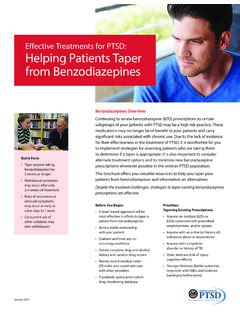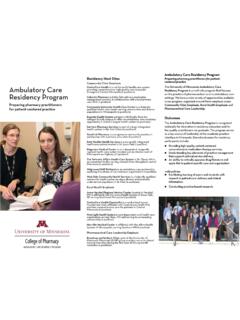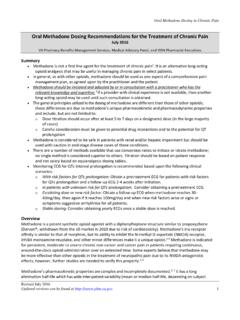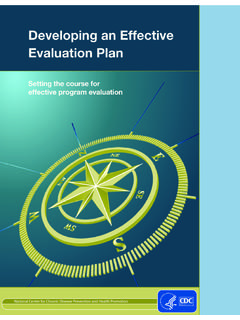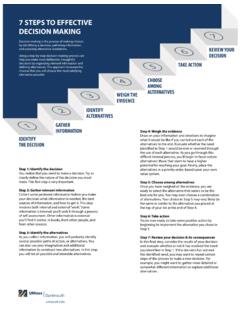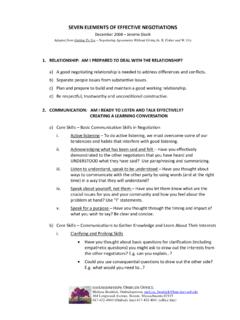Transcription of Effective Treatments for PTSD: Consider Cognitive ...
1 Recommended Psychotherapy Tre at m e nt s Cognitive behavioral therapy (CBT) is the most Effective treatment for ptsd . CBT usually involves meeting with a therapist weekly for up to four months. The two most Effective types of CBT for ptsd are Cognitive Processing Therapy (CPT) and Prolonged Exposure (PE).In CPT the therapist and patient examine what the patient is thinking and telling himself about the trauma and together they decide whether those thoughts are accurate or inaccurate. It can be done individually or in a works through repeated exposure to thoughts, feelings, and situations that the patient has been avoiding and helps the patient learn that reminders of the trauma do not have to be avoided.
2 PE is done individually with a Medications Recommended medications for ptsd include SSRIs and that Work Both antidepressants and CBT have been shown Effective for the treatment of ptsd . Learn How to Talk to Your Patients About: Recommended first line Treatments for ptsd Recommended treatment options for insomnia and anxiety symptoms related to ptsd New information about anti-anxiety medications and PTSDE ffective Treatments for ptsd : Consider Cognitive Behavioral Therapy (CBT) as First Line TreatmentPTSD OverviewPosttraumatic stress disorder, or ptsd , can occur after someone goes through or sees a traumatic event like combat, physical or sexual abuse, assault, serious accidents or natural disasters.
3 A person may have ptsd if their reactions to these events do not go away after time and they disrupt their daily life. Exposure to trauma is common in the Veterans you treat. Nine percent of Veterans who are being seen at the VA have ptsd . Among Veterans who served in Iraq and Afghanistan, and who use VA care, the rate is much higher: one in four men and one in five women have ptsd . The good news is that there are Effective Treatments available for ptsd . 21 Cognitive Behavioral TherapyEffect size (d).431. 28 Watts, Schnurr et al., 2013 Additional ResourcesNational Center for ptsd : Clinical Practice Guidelines: Campaign (learn about ptsd and ptsd treatment from Veterans): Your Local Evidence Based Psychotherapy Coordinator: Effects of treatment on ptsd Severity This graph shows effect sizes for antidepressants and Cognitive behavioral therapy.
4 An effect size tells us how big or noticeable a change is. An effect size of .08 is considered large which means that other people would notice that there has been a 2015 Treating Anxiety and Insomnia in Patients with PTSDIf you have traditionally prescribed benzodiazepines for anxiety or insomnia symptoms, there are better treatment options now available. Anxiety Psychotherapy treatment Option(s): Cognitive Behavioral Therapy (CBT), CBT for Anxiety Medication Option(s): SSRIs and venlafaxine Insomnia Psychotherapy treatment Option(s): Cognitive Behavioral Therapy for insomnia (CBT-I) is highly Effective . Other forms of CBT may be helpful.
5 Medication Option(s): low dose trazodone,prazosin, amitriptyline, doxepin, or diphenhydramineCautions about Benzodiazepines There is increasing evidence of harmful side effects from chronic benzodiazepine use Benzodiazepines do not help core ptsd symptoms If you are prescribing benzodiazepines to treat anxiety, other Treatments including SSRIs and CBT are better options Cognitive Behavioral TherapyAntidepressantsPrazosinTrazodoneH ow it WorksHelps you learn about how your beliefs and memories about your trauma have impacted your lifeFocuses on symptoms such as anxiety or insomniaHelps brain cells send and receive messagesBlocks adrenaline in the brainReduces nightmaresHelps brain cells send and receive messagesLimited effects on overall symptoms of PTSDI mproves sleepPotential BenefitsDecreases ptsd symptoms, anxiety, depression, and can improve sleepImproves ptsd symptoms.
6 But has variable effects on sleepSignificant improvement in sleepImproves sleep disruption for ptsd patientsPotential DrawbacksTalking about trauma can be difficult initiallyMay cause headaches, nausea, decreased sex drive, and fatigueMay cause lightheadednessMay worsen moodDuration8-15 weekly sessions with long-lasting effectsUsually need to continue indefinitelyUsually need to continue indefinitelyUsually need to continue indefinitelyEvidence of SuccessResearch shows this is one of the most Effective Treatments for PTSDS ignificant overall improvement in ptsd -related symptoms and recommended for anxietySignificant improvement in sleep and other ptsd -related symptomsHelpful for sleep.
7 But not for overall symptoms of ptsd treatment Comparison ChartCopyright 2015 by the National Center for ptsd | treatment Options for PTSDVA/DoD Clinical Practice Guideline Recommendations Medications for PTSDB alance = Benefit - HarmSRSubstantialSomewhatUnknownNoneASSR Is, SNRIsBMirtazapine, TCAs, MAOIs (phenelzine), Prazosin (nightmares), Nefazodone (caution)CPrazosin ( ptsd )DGuanfacine, Topiramate, Valproate, Tiagabine Benzodiazepines (harm), Risperidone (adjunct)IBuspirone, Bupropion, Non-Benzodiazepine Hypnotics, Lamotrigine, Gabapentin, Clonidine, Trazodone (adjunct), Atypical antipsychotics (mono), Atypical antipsychotics (besides Risperidone) (adjunct) Conventional antipsychotics, PropranololA A strong recommendation that clinicians provide the intervention to eligible patients.
8 B A recommendation that clinicians provide (the service) to eligible patients. C No recommendation for or against the routine provision of the intervention is made. Intervention may be considered. D A recommendation against routinely providing the intervention to asymptomatic patients. I Insufficient evidence to recommend for or against routinely providing the intervention.
